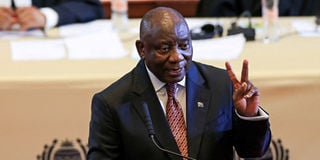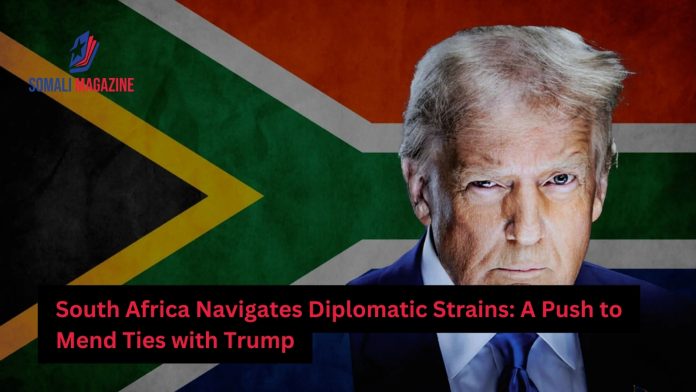Facebook Twitter Instagram Somali Magazine - People's Magazine
South Africa is working to ease tensions with the United States as relations between the two nations hit a new low under President Donald Trump’s administration. The expulsion of South Africa’s ambassador to the U.S., Ebrahim Rasool, has further strained ties, prompting Pretoria to prioritize diplomatic efforts to repair the relationship. The stakes are high, with trade, aid, and geopolitical cooperation hanging in the balance.
The diplomatic fallout began when Rasool was declared persona non grata by U.S. Secretary of State Marco Rubio, following remarks critical of Trump’s “Make America Great Again” movement. Rasool’s comments, made during a webinar, described the movement as rooted in “supremacism,” sparking outrage in Washington. Rubio labeled Rasool a “race-baiting politician” and accused him of harboring anti-American sentiments. The expulsion has been widely criticized in South Africa, with opposition parties urging President Cyril Ramaphosa not to bow to U.S. pressure.
Despite the uproar, Ramaphosa has taken a measured approach, describing the incident as a “hiccup” in bilateral relations. Speaking to journalists, he emphasized the importance of maintaining strong ties with the U.S., South Africa’s second-largest trading partner after China. “Improving our relationship with the United States is a priority for us,” Ramaphosa stated. “We will seek to ensure that our relations are on a good footing.”
The expulsion comes amid broader tensions between the two nations. Trump’s administration has taken a hardline stance on several issues, including South Africa’s land reform policies and its legal challenge against Israel at the International Court of Justice. Trump has accused South Africa of discriminating against white Afrikaner farmers and has offered them refugee status in the U.S., a move Pretoria has condemned as inflammatory. Additionally, Trump’s decision to cut aid to South Africa, including funding for HIV/AIDS programs, has deepened the rift.
South Africa’s government is now exploring ways to navigate the challenges posed by Trump’s administration. Analysts suggest that appointing a new ambassador with a more conciliatory approach could help mend ties. Business leaders and government officials are also being dispatched to Washington to engage with U.S. policymakers and rebuild trust.

The diplomatic row has sparked a broader debate about South Africa’s foreign policy priorities. Critics argue that Pretoria’s alignment with nations like China, Russia, and Iran has alienated traditional allies like the U.S. The African National Congress (ANC)-led government has defended its stance, emphasizing the need for an independent foreign policy that reflects South Africa’s values and interests.
The opposition, however, has called for a more pragmatic approach. The Democratic Alliance (DA) has urged the government to prioritize economic diplomacy and avoid actions that could jeopardize trade and investment. “The U.S. is a critical partner for South Africa’s economic growth. We cannot afford to let political disagreements undermine this relationship,” said DA spokesperson Willie Aucamp.
The expulsion of Rasool has also reignited discussions about the role of ambassadors in shaping foreign policy. Some critics have questioned the ANC’s practice of appointing political figures to key diplomatic posts, arguing that professional diplomats with expertise in international relations would be better suited to navigate complex geopolitical landscapes.
As South Africa seeks to minimize friction with Trump’s administration, the focus remains on finding common ground and addressing mutual concerns. The path forward will require careful diplomacy, strategic engagement, and a commitment to preserving the long-term interests of both nations.

